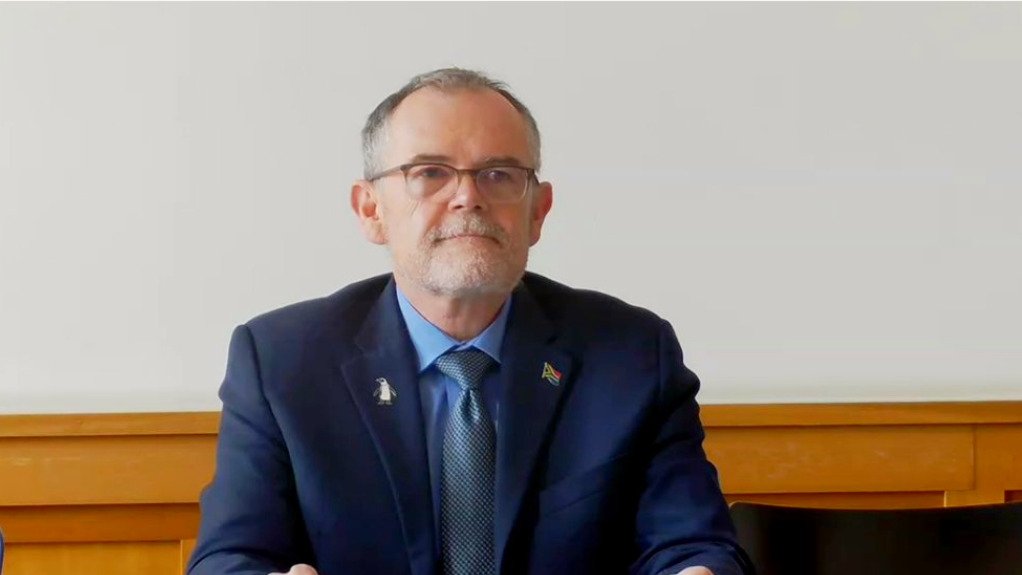George insists new air-pollution exemptions for eight Eskom coal stations not a ‘blanket reprieve’
Forestry, Fisheries and the Environment Minister Dr Dion George has granted Eskom air-pollution exemptions for eight power stations that would otherwise have been forced to close on April 1. He insists, however, that the exemptions do not represent a “blanket reprieve” and that they have been granted together with “rigorous conditions”.
On December 10, Eskom applied for relief from the minimum emission standards (MES) for eight of its coal-fired power stations, namely Duvha, Kendal, Lethabo, Majuba, Matimba, Matla, Medupi, and Tutuka.
The applications were made in line with Section 59 of the National Environmental Management: Air Quality Act, 2004, and followed the granting last year by George’s predecessor, Barbara Creecy, of permission allowing Eskom to continue to operate the aged Hendrina, Grootvlei, Arnot, Camden and Kriel at existing MES plant limits until their decommissioning on March 31, 2030.
The decision of both Ministers followed an intense period of electricity insecurity, with loadshedding, which has been a persistent threat since 2007, having intensified to the point where it was being implemented almost daily in 2023.
There have also been bouts of rotational power cuts in the early months of 2025, despite a material waning of loadshedding on the back of coal plant improvements following a big taxpayer funded debt-relief programme at Eskom, as well as significant private investment in solar PV and batteries, which has helped reduce demand and create space for much-needed maintenance.
On March 31, George announced his MES decision, which he said sought to balance the imperatives of energy security, economic stability, and environmental protection.
During a briefing in Cape Town, he announced that two of the stations (Duvha and Matla) had been granted exemptions until their decommissioning date in 2034.
The other six, were granted five-year exemptions until April 1, 2030, during which time actions would need to be taken to mitigate their pollution and to prepare the stations to operate legally thereafter.
KEY CONDITIONS
Some of the near-term mitigation actions ordered, included:
- The deployment of air quality monitoring stations and a data-free alert App within eight months;
- The appointment of an environmental health specialist within three months, and the extension of health-screening programmes within six months in affected communities, alongside mobile clinics and greenspace initiatives;
- The expansion of interventions to 96 000 households within 12 months, while addressing waste and ash dumps near power stations;
- The immediate publication of real-time emissions data, with additional monitoring stations to be installed within 12 months;
- The completion of a revised cost-benefit analysis within six months regarding Medupi’s delayed flue gas desulphurisation (FGD) retrofit; and
- The publication by the end of March yearly of a detail report on what progress Eskom was making to integrate renewable energy into the grid.
George even went so far as to suggest specific energy policies that he said required priority if South Africa were to transition to a point where there would be security of supply, while also meeting the obligation outlined in Section 24 of the Constitution guaranteeing a right to an environment that is not harmful to health and well-being.
Some of his recommendations included transitioning the Independent Power Producer Office into an independent Transmission System Operator to streamline procurement; accelerating transmission infrastructure under the National Transmission Company South Africa to facilitate seamless grid integration of renewable projects; and the establishment of a competitive power market by April 1, 2026.
WHAT HAS BEEN GRANTED?
Meanwhile George also outlined the following specific decision for each of the affected coal-fired power stations:
- An MES exemption for the Duvha power station until its planned decommissioning date of February 21, 2034, alongside conditions for mitigating the station’s environmental impact until it is phased out.
- A five-year exemption, until April 1, 2030, for Kendal that also requires Eskom to implement targeted emission reduction measures and accelerate renewable-energy integration to offset Kendal’s environmental footprint.
- A five-year exemption for Lethabo until April 1, 2030, along with conditions to address its emissions profile as well as health impacts, considering the station’s proximity to populated areas.
- A five-year exemption to April 1, 2030, for the Majuba power station alongside requirements to enhance the plant’s operational efficiency and flexibility, while adhering to stringent monitoring and mitigation requirements.
- A five-year exemption for Matimba until April 1, 2030, with a requirement that Eskom implements socioeconomic offset and emission reduction studies.
- An MES exemption for the Matla power station until its planned decommissioning date of July 20, 2034, with a condition that its environmental impact is curtailed through mandatory health and air quality measures.
- A five-year exemption until April 1, 2030, for the new Medupi power station to achieve full MES compliance, notably with the installation of FGD technology. This exemption mandates a revised cost-benefit analysis for FGD within six months, alongside other conditions to minimise emissions.
- And a five-year exemption to April 1, 2030 for Tutuka to provide Eskom with a window to stabilise the troubled station’s contribution to the grid while accelerating renewable-energy projects to reduce its coal dependency.
Describing his decision as “pragmatic” and “sensible”, the Minister highlighted that Eskom, which had received several exemptions over the past number of years, had not been granted its request for longer exemption periods.
He also insisted that he intended holding the State-owned company accountable for meeting its air-pollution obligations.
“I do not believe that this puts Eskom under undue pressure.
“It certainly puts them under pressure and that is actually my intention, because mor of the same thing is not going to work . . . the game has changed,” George said.
The Minister added that he was eager to receive Eskom’s response, as well as to engage with both the utility and Electricity and Energy Minister Dr Kgosientsho Ramokgopa on ensuring practical implementation.
George did not discount a legal appeal of the decision, however, but said that should it reach such a point he intended to win.
ESKOM ASSESSING DECISION
In response, Eskom said it would "review" the decision before making any further comment.
"Eskom notes that today’s decision maintains its license to operate at Medupi, Majuba, Matimba, Kendal, Lethabo, Tutuka, Matla and Duvha power stations, which contribute a total of 29 000 MW to South Africa’s electricity grid and play a material role in maintaining the country’s energy security, beyond the 31 March 2025 deadline.
"Eskom is committed to working with the DFFE and all stakeholders, and it will make further announcements in due course.
"The company remains dedicated to aligning with regulatory requirements and implementing sustainable solutions to ensure long-term operational efficiency, reducing any negative impacts on health and environmental stewardship."
Article Enquiry
Email Article
Save Article
Feedback
To advertise email advertising@creamermedia.co.za or click here
Press Office
Announcements
What's On
Subscribe to improve your user experience...
Option 1 (equivalent of R125 a month):
Receive a weekly copy of Creamer Media's Engineering News & Mining Weekly magazine
(print copy for those in South Africa and e-magazine for those outside of South Africa)
Receive daily email newsletters
Access to full search results
Access archive of magazine back copies
Access to Projects in Progress
Access to ONE Research Report of your choice in PDF format
Option 2 (equivalent of R375 a month):
All benefits from Option 1
PLUS
Access to Creamer Media's Research Channel Africa for ALL Research Reports, in PDF format, on various industrial and mining sectors
including Electricity; Water; Energy Transition; Hydrogen; Roads, Rail and Ports; Coal; Gold; Platinum; Battery Metals; etc.
Already a subscriber?
Forgotten your password?
Receive weekly copy of Creamer Media's Engineering News & Mining Weekly magazine (print copy for those in South Africa and e-magazine for those outside of South Africa)
➕
Recieve daily email newsletters
➕
Access to full search results
➕
Access archive of magazine back copies
➕
Access to Projects in Progress
➕
Access to ONE Research Report of your choice in PDF format
RESEARCH CHANNEL AFRICA
R4500 (equivalent of R375 a month)
SUBSCRIBEAll benefits from Option 1
➕
Access to Creamer Media's Research Channel Africa for ALL Research Reports on various industrial and mining sectors, in PDF format, including on:
Electricity
➕
Water
➕
Energy Transition
➕
Hydrogen
➕
Roads, Rail and Ports
➕
Coal
➕
Gold
➕
Platinum
➕
Battery Metals
➕
etc.
Receive all benefits from Option 1 or Option 2 delivered to numerous people at your company
➕
Multiple User names and Passwords for simultaneous log-ins
➕
Intranet integration access to all in your organisation




















